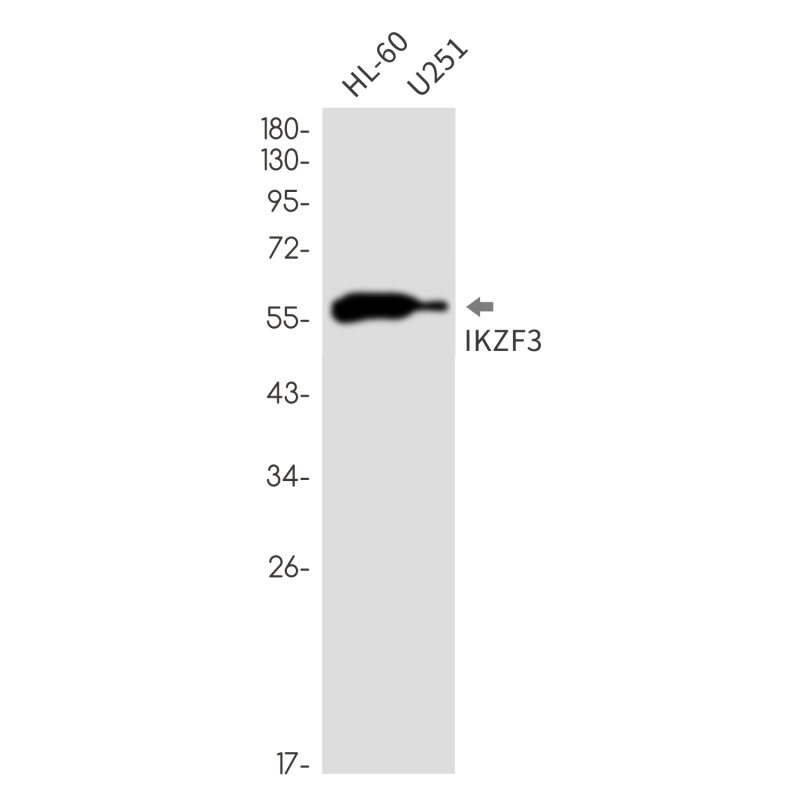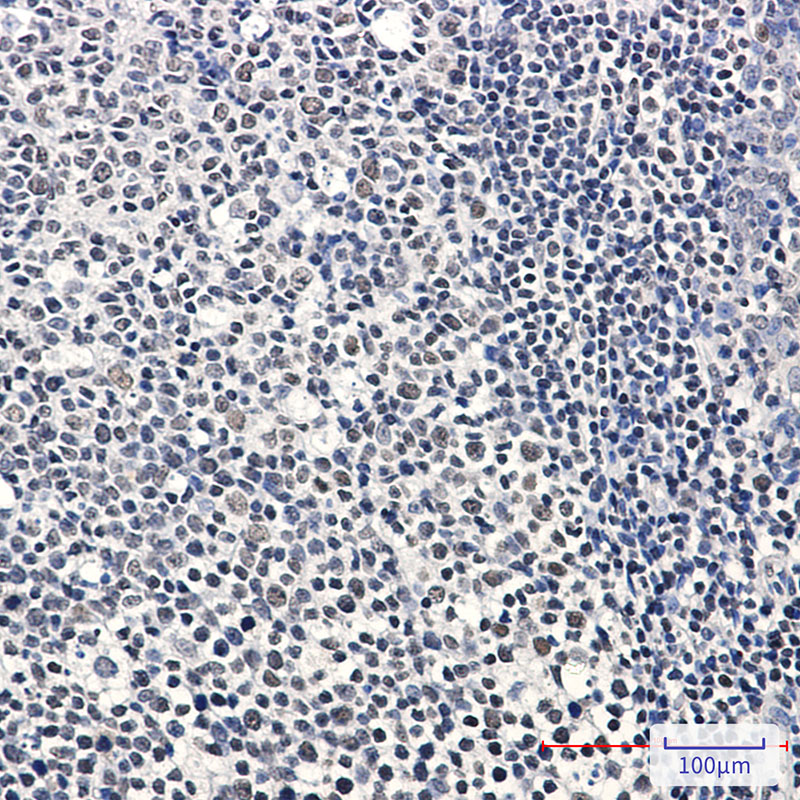

| WB | 1/500-1/1000 | Human,Mouse,Rat |
| IF | 咨询技术 | Human,Mouse,Rat |
| IHC | 1/50-1/100 | Human,Mouse,Rat |
| ICC | 技术咨询 | Human,Mouse,Rat |
| FCM | 咨询技术 | Human,Mouse,Rat |
| Elisa | 咨询技术 | Human,Mouse,Rat |
| Aliases | IKZF3; ZNFN1A3; Zinc finger protein Aiolos; Ikaros family zinc finger protein 3 |
| Entrez GeneID | 22806 |
| WB Predicted band size | Calculated MW: 58 kDa; Observed MW: 58 kDa |
| Host/Isotype | Rabbit IgG |
| Antibody Type | Primary antibody |
| Storage | Store at 4°C short term. Aliquot and store at -20°C long term. Avoid freeze/thaw cycles. |
| Species Reactivity | Human |
| Immunogen | A synthetic peptide of human IKZF3 |
| Formulation | Purified antibody in TBS with 0.05% sodium azide,0.05%BSA and 50% glycerol. |
+ +
以下是关于IKZF3抗体的3篇文献摘要概括,供参考:
1. **《IKZF3/Aiolos is a novel target in multiple myeloma》**
- **作者**:Hervé Avet-Loiseau, Kenneth C. Anderson
- **摘要**:研究探讨IKZF3在多发性骨髓瘤中的功能,发现其高表达与疾病进展相关。通过使用靶向IKZF3的单克隆抗体,在体外和动物模型中显著抑制肿瘤细胞增殖并诱导凋亡,提示其作为治疗靶点的潜力。
2. **《IKZF3 regulates immune cell function and survival in chronic lymphocytic leukemia》**
- **作者**:Catherine C. Coombs, John G. Gribben
- **摘要**:分析IKZF3在慢性淋巴细胞白血病(CLL)中的作用,发现其通过调控B细胞受体信号通路影响细胞存活。实验中使用抗IKZF3抗体阻断功能后,增强化疗药物敏感性,为联合治疗提供依据。
3. **《Aiolos silencing enhances CAR-T cell efficacy against solid tumors》**
- **作者**:Ying Li, Carl H. June
- **摘要**:研究IKZF3在CAR-T细胞疗法中的抑制作用,发现敲低IKZF3或使用中和抗体可增强T细胞抗肿瘤活性。临床前模型显示,靶向IKZF3显著提升实体瘤清除率,具有转化医学价值。
以上内容基于公开研究背景整理,具体文献细节建议通过学术数据库进一步验证。
IKZF3. a member of the IKAROS family of zinc-finger transcription factors, encodes the protein Aiolos, which plays a critical role in lymphocyte development and immune regulation. Expressed primarily in B cells, T cells, and plasma cells, IKZF3 works in tandem with IKZF1 (Ikaros) to modulate gene expression by recruiting chromatin-remodeling complexes. It regulates B-cell differentiation, antibody production, and T-cell activation, maintaining immune homeostasis. Dysregulation of IKZF3 is implicated in autoimmune disorders (e.g., lupus, rheumatoid arthritis) and hematologic malignancies, particularly B-cell malignancies like multiple myeloma and chronic lymphocytic leukemia.
IKZF3-targeting antibodies have emerged as tools for studying its function and potential therapeutic agents. In research, these antibodies help detect IKZF3 expression in tissues or cell lines, aiding in mechanistic studies of immune dysfunction or cancer progression. Therapeutically, IKZF3 degradation via cereblon-binding agents (e.g., immunomodulatory drugs like lenalidomide) has shown efficacy in hematologic cancers, though not strictly antibodies. Direct antibody-based approaches remain under exploration, focusing on blocking oncogenic IKZF3 interactions or delivering cytotoxic payloads. Challenges include understanding tissue-specific IKZF3 isoforms and minimizing off-target effects. Ongoing studies aim to clarify IKZF3's dual roles in immune regulation and malignancy, highlighting its potential as a biomarker or therapeutic target.
×